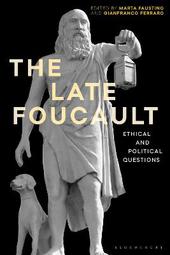
|
The Late Foucault: Ethical and Political Questions
Hardback
Main Details
Description
Michel Foucault is one of the most important and controversial thinkers of the twentieth century and one of the leading figures in contemporary Western intellectual life and debate. The recent publication of his last lecture courses at the College de France (1981-1984), together with the short texts, essays, and interviews from the same period, have sparked new interest in his work, allowing for a new understanding of his philosophical trajectory and challenging several interpretations produced over the last few decades. In this later phase of his thinking, Foucault deepens and expands the course of his preceding works on the genealogy of subjectivity, while at the same time adding a significant ethical and political dimension to it. His focus on the ancient ethics of care of the self and technologies of self-constitution during this period adds important nuances to his previous positions on power, truth, and subjectivity, shedding new light on his philosophical endeavour as a whole and situating his reflections at the centre of current moral debates. Focusing on the last stage of Foucault's thought, this book brings together international scholars to relaunch the critical debate on the significance of Foucault's so-called "ethical turn" and to discuss the ways in which the perspectives offered by Foucault in this period might help us to unravel modernity, giving us the tools to understand and transform our present, ethically and politically.
Author Biography
Marta Faustino is a research fellow at the Nova Institute of Philosophy (IFILNOVA), where she currently coordinates the Art of Living Research Group. Her main research focus is the relationship between philosophy and therapeutic and self-cultivating practices. She is the author of several articles on Nietzsche, Hadot, Foucault and the Hellenistic philosophers and co-editor of Nietzsche e Pessoa: Ensaios (Tinta-da-China, 2016) and Rostos do Si (Vendaval, 2018). Gianfranco Ferraro is a post-doctoral researcher at the Nova Institute of Philosophy (IFILNOVA). His research focuses on philosophical forms of conversion, particularly concerning Foucault, Nietzsche, and the history of utopian thought. Recent publications on this topic include "Da vocacao" (2019), "From Merleau-Ponty to Foucault (and Beyond): Towards a Contemporary Ontology of Immanence" (2019), "Exercicios de inactualidade" (2019), and "La conversione del quotidiano: Foucault e l'utopia come tecnica di vita" (2019). He is a member of the Red Iberoamericana Foucault and director of the international journal Thomas Project: A Border Journal for Utopian Thoughts.
ReviewsMarta Faustino and Gianfranco Ferraro, along with their contributors, have provided us with what might be the definitive guide to Foucault's thinking and writing in the last five years of his life. The Late Foucault is decidedly the best first place to go on the late Foucault. * Joseph Westfall, Professor of Philosophy, University of Houston-Downtown, USA * An outstanding and timely collection, casting fresh light on Foucault's thinking in its last phase. These engaging, incisive essays provide a reappraisal of Foucault's late turn to the ethics of the ancient world, and its significance for his views on subjectivity, truth and power in the present. * Christopher Falzon, Visiting Fellow in Philosophy, University of New South Wales, Australia *
|